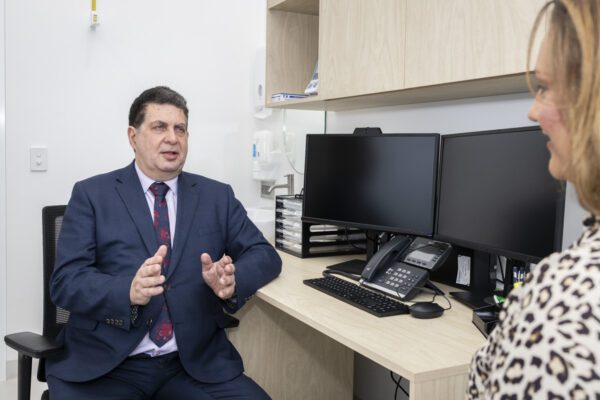“OCD is a serious mental illness that can incapacitate people, causing fear, worry, anxiety, stress, and obsessions that are extremely difficult to live with. In its more chronic forms, it leaves some people utterly at the mercy of their fears, affording them a very low quality of life.”
– Peter Hayton, The Banyans Founding Chief Psychologist.
OCD was previously classified as an anxiety disorder, and individuals with OCD often also suffer from anxiety disorders.
People living with OCD also have a higher risk of having other mental illnesses, such as depression, tic disorder, and bipolar disorder.
How Common is OCD in Australia?
Around 2-3%, or more than 700, 000 Australians, currently have Obsessive-Compulsive Disorder (OCD). This is even more common when looking specifically at first-degree family members, where the likelihood of developing OCD is 10-11%. OCD is debilitating and overwhelming and is the fourth most common psychiatric disorder in the world after phobias, substance abuse, and major depression.
OCD vs Intrusive Thoughts – What’s The Difference?
Understanding the differences between unwanted obsessions and intrusive negative thoughts is important for accurate diagnosis and effective treatment, and for family members providing support. OCD often requires professional intervention, such as cognitive-behavioural therapy (CBT) or medication, while intrusive thoughts might be managed with stress reduction techniques and general mental health support.
People with OCD typically recognise that their obsessions and compulsions are excessive or unreasonable, but the person feels unable to control them. The person’s obsessions often manifest as obsessive thoughts, which are intrusive and persistent mental disturbances that cause significant distress and lead to visible compulsions aimed at alleviating anxiety or preventing perceived defects or negative outcomes.
Obsessive Compulsive Disorder (OCD)
While often misrepresented in popular culture and by the use of common themes in vernacular language, OCD is a serious mental health condition characterised by:
Obsessions: Persistent recurring thoughts, urges, or unwanted thoughts and images that cause significant anxiety or distress. These are intrusive and recurrent.
Compulsions: Repetitive behaviours or mental acts that an individual feels compelled to perform in response to an obsession or according to rigid rules. These compulsive behaviours are meant to reduce anxiety or prevent a feared event, even though they are not realistically connected to what they are meant to prevent, and only provide temporary relief.
The Diagnostic and Statistical Manual (DSM-5) classifies OCD and outlines the criteria for diagnosis.
Intrusive Thoughts
Intrusive thoughts are unwanted, involuntary thoughts, mental images, or ideas that can be disturbing or distressing. They are common and experienced by many people without any mental health condition. However, the key differences from OCD include:
Frequency and Impact: While intrusive thoughts can be frequent and distressing, they do not usually lead to compulsive behaviours aimed at neutralising the thought.
Response to Thoughts: People without OCD may find intrusive thoughts upsetting but can usually dismiss them without significant anxiety or ritualistic behaviour.
Lack of Control: Intrusive thoughts occur in various contexts, such as after a traumatic event or during periods of high stress. They are often brief and do not interfere significantly with daily functioning.
Key Differences
Nature of Thoughts: In OCD, the obsessions are persistent and highly distressing, often linked with specific compulsions. Intrusive thoughts, while disturbing, do not usually lead to compulsions and are more easily dismissed.
Impact on Life: OCD significantly impairs daily functioning due to the time-consuming nature of compulsions and the distress caused by obsessions. Intrusive thoughts, on their own, are less likely to disrupt daily life to the same extent.
Response and Management: People with OCD often feel compelled to perform rituals to manage their anxiety, whereas those with intrusive thoughts might experience temporary distress but do not engage in repetitive behaviors.
What are the Different Types of OCD?
There are currently four core dimensions or types of OCD, each with a range of OCD subtypes with varying symptoms, often occurring in more than one type.
So, what are these 4 common types of OCD? Here’s how they’re currently defined:
- Contamination OCD
- Symmetry and Perfection OCD
- Harm OCD
- Taboo or Immoral Thoughts OCD
Another example of a subtype is Relationship OCD, which focuses on obsessive thoughts related to romantic relationships, such as questioning their partner’s love or worrying excessively about their partner’s happiness.
Also, Body Dysmorphic Disorder (BDD) is classified as obsessive-compulsive and related disorders, indicating a significant overlap in their features and underlying mechanisms.
Below, we explore each of the four types of OCD in more detail.
The Most Common Types of OCD
Understanding the various OCD types is crucial for recognising the diverse ways in which this disorder can manifest and for ensuring that individuals receive the most appropriate and effective treatment.
1. Contamination OCD
Compulsive contamination fears are those most associated behaviours with all types of OCD. People with contamination OCD perform excessive and repetitive behaviours, such as washing their hands, to relieve the severe distress associated with obsessional fears of contamination and germs. This can lead to contact dermatitis due to excessive washing and exposure to soaps and detergents.
Behaviours associated with contamination compulsion can also include compulsively cleaning both inside and outside a house, clothing, living areas, furniture, and bedding.
Mental Contamination
Mental contamination is similar to contamination OCD but is a cognitive belief in uncleanliness of self.
It is understood that it can result in people spending hours washing incessantly. The emotional distress, or contamination, caused creates these physical compulsions.
2. Symmetry and Perfection OCD: Compulsive Behaviours
Symmetry and perfection are other behaviours most often associated with OCD. It presents as an obsession with order and symmetry, and these people with OCD may have superstitions about specific numbers, colours, or arrangements.
Compulsive counting, tapping and repeating words are all compulsive behaviours used to relieve the anxiety brought on by the need to order and arrange.
“People with OCD can have a desperate need for exactness,” explains Peter. “Everything in their lives needs to be symmetrical and ordered, such as an equal number of people sitting at a dinner table, or children’s toys need to be displayed in order of height, or pencils arranged by colour hues.”

Checking
Some OCD compulsions include believing that if everything isn’t exact or ‘perfect’, something terrible will happen, or there will be a punishment. This leads to compulsive checking that things are in the ‘correct’ order, the right arrangement, or organised perfectly to avoid retribution.
This anxiety caused by obsessive fears leads to behaviour such as repetitively turning off the stove and checking locks and switches. This behaviour can also include repeatedly checking on loved ones to ensure they are safe.
Hoarding (sometimes referred to as Hoarding Disorder)
Hoarding is excessively saving items that others may view as useless. The persistent difficulty in parting with possessions leads to clutter that interrupts life.
Hoarding causes significant distress to those dealing with it personally and loved ones living alongside the OCD and disrupts day-to-day functioning. Many people with hoarding OCD report a background of emotional deprivation and experiences of sudden traumatic loss.
Some people experience the need to hoard items they believe will cause harm to others, such as broken items (like lightbulbs and glass), or even excrement, in the belief their hoarding will keep others safe.
Treating teams that assist with transitioning the more extreme environments combined with therapy for the person living with this disorder are essential to consider.

3. Harm OCD
Harm OCD is characterised by violent, disturbing thoughts of causing harm to someone and the responses that a person uses to cope with these thoughts. These symptoms of OCD include the fear that either they or others will be hurt, a fear of losing control, and aggressive, intrusive thoughts. These thoughts can become frequent enough to become invasive and take over the person’s life.
“Participating in compulsions and rituals helps decrease anxiety regarding the thought,” says Peter. “People will feel less fearful once the ritual is complete, but then the disturbing thought returns, causing cycles of doubt, fear, and compulsive behaviour.”
4. Taboo OCD
Taboo or immoral thought OCD involves sexual thoughts, aggressive, and religious or moral obsessions and thoughts. These obsessions involve excessively taboo thoughts that are hard to share, even with emotionally close people.
People with this dimension of OCD believe they are the only ones with these unwanted, intrusive thoughts. The hostile thoughts can relate to aggressively harming themselves or others physically or sexually and can also include praying excessively or engaging in rituals triggered by religious fear.
This type of OCD can result in an immense amount of shame and fear, as the very nature of the obsession is deemed immoral or unmentionable.
Rarer Types of OCD
In addition to the more common forms of OCD, there are also other subtypes that your consulting psychologist will be able to identify and diagnose. These less prevalent forms of OCD can manifest in various ways, often involving unique and specific obsessions and compulsions. Pediatric autoimmune neuropsychiatric disorders can cause OCD symptoms in children and young adults to emerge suddenly following a strep infection (such as strep throat), highlighting a distinct connection between this autoimmune response and the onset of obsessive thought or common compulsions. Consulting with a psychologist can help ensure an accurate diagnosis and appropriate treatment plan tailored to your specific type of OCD.
Can You Get Treatment for OCD?
It’s essential to remember that help and treatment for OCD, a condition classified within the broader category of mental disorders, are available, and things can improve with a multidisciplinary approach to medication and specific types of psychotherapy. Cognitive-Behavioural Therapy (CBT) is highly effective in treating OCD.
In some cases, medications such as selective serotonin reuptake inhibitors (SSRIs) can be prescribed to help manage symptoms by altering the brain’s chemical balance.
Additionally, support groups and educational resources can provide further assistance and understanding for those dealing with OCD thoughts. It’s also important to consider the role of lifestyle changes, such as stress management techniques, regular exercise, and maintaining a healthy diet, which can contribute positively to treatment outcomes.
For those with rarer types of OCD, specialised interventions tailored to their unique symptoms may be necessary. Collaborating with a psychologist or psychiatrist ensures a comprehensive treatment plan that addresses both the psychological and medical aspects of the disorder.
With the right support and treatment, individuals with OCD can lead fulfilling and productive lives.

How The Banyans Can Help Treat OCD
At The Banyans, treatment for OCD is grounded in a multidisciplinary methodology, personalised for each guest.
A mental health professional plays a crucial role in the treatment process, providing proper evaluation and tailored treatment options to help manage symptoms effectively.
The combination of medical support, psychiatric care, psychological and emotional counselling, nutritional support and physical exercise assists individuals in relieving symptoms while learning effective coping strategies. The Banyans offer residential programs and day programs designed to treat various types of OCD.
For further support and information about an OCD recovery treatment program at The Banyans, call our expert team 24/7 on 1300 226 926 or make an enquiry below.





